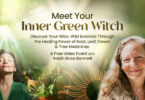Guest Writer for Wake Up World
The usual tendency in our modern secular thinking is to view the outer world as separate from ourselves, but really it is just a partial reflection of what we fundamentally are. Objective reality is one of two pieces. Both pieces make up one whole. The other part is our subjective world, which are our feelings, thoughts and beliefs.
In this ancient and rebirthed understanding, we are realizing we are both the inner and outer worlds.
Now I could go into why quantum physics specifies that these two portions are inseparable, or why ancient wisdom and modern mystics say the same thing, but if we’re on this path we intuitively and possibly even logically know this already.
Instead, here I’m going to focus on what actually makes up our experience, as well as ways to find our peace by loving our experience, because it’s not always easy to accept and embrace all of what we perceive in life.
Some of it is simply hard for our hearts to take and challenging for our minds to fathom. But our experience is much like an intimate relationship: it has its ups and downs, there are things that need to change, there are things that we wouldn’t change for the world and there are hard lessons involved which hopefully inspire us to develop ourselves. And just like we love our partner regardless of their positives and negatives, we should also love our experience, irrespective of its strengths and weaknesses.
Another way to begin to look at it is by considering how we love ourselves. Just as we don’t condone everything about our partner, yet we still love them, we still love ourselves, even if sometimes we’re not proud of all our feelings, thoughts and actions. After all, we make mistakes, learn and navigate our entire lives growing into our new, more developed selves.
But our experience is much bigger than our ego, or our perception and the ingredients of our ‘illusory separate’ selves. It’s also the objects of our experience, because if we change the objects, we also change the experience. Therefore, it is the two realities combined; it’s an intimate interconnection between the inner and outer worlds.
Let’s put it in a simple model:
- Subjective world = feelings, thoughts, beliefs, actions
- Objective world = body, people, earth, universe.
- Experience = the interconnected total of our subjective and objective worlds.
This means that there is something which is the bridge between or the basis of these two seemingly separate realities.
Both pioneer scientists and contemporary spirituality view consciousness (or something like consciousness) as the ground of all being and therefore the bridge of these realms. Though to be clear: it’s not our individual consciousness but the whole of consciousness which is the unifying factor.
One way to illustrate this is through the analogy of a fire. The whole of consciousness is the fire, the objective world including our brain is a flame in the fire and our subjective world is our flame’s heat. All are the fire. All are consciousness.
One common assumption about our individual consciousness is that it is generated by the big brain (containing 100 billion neurons), the second brain (100 million neurons embedded in the walls of our gut) and the heart (which contains 40,000 neurons); much like a generator creates electricity. Even though this is voiced by some materialists as being a proven scientific fact, it’s not – it’s speculation based primarily on the evidence that if we tamper with the brains (particularly the big brain) in certain ways, it tampers with our awareness in particular ways too.
But just as all scientists and laymen alike should know – correlation does not imply causation. Just because our individual consciousness changes when we alter our brain does not mean that the brain created the consciousness in the first place.
The alternative to this explanation, one that is receiving support from emerging scientific evidence, is that the brain receives or tunes into consciousness, much like a radio or television tunes into signals. If we tamper with our radio or TV set, then it will no doubt have an associated impact on the way the signal is received, without actually changing the signal itself. Therefore, just because modifying our brain can alter our experience, does not inherently mean that we have changed consciousness itself. We have simply changed our experience of consciousness.
This makes sense when we acknowledge how our experience is influenced by what’s happening both inside and outside of us. We’re tuning into particular frequencies of consciousness to have an experience which is co-created by both our inner and outer worlds.
When we begin to meditate this point becomes even clearer. Think of our conscious awareness as the light from a torch and the darkness as our subconscious mind. When we meditate, we can navigate through our subconscious mind by making it conscious with our light. Meditation is the act of navigating our awareness through our subconscious mind. The more skilled we become at expanding our mind with meditation, the deeper we go into the darkness of our subconscious. Then suddenly – as many experienced meditators agree – we potentially reach beyond our subconscious mind.
In other words – advanced meditation can craft our individual awareness into a cosmic consciousness or even consciousness itself. This is also a common experience when taking a psychedelic substance. Over and over again, through countless individuals and a wide array of tribal, traditional and current cultures, it is believed that during a psychedelic trip (or other trance-induced activity) the mind becomes one with the whole of reality.
The line between the internal and external worlds has become reverently blurred. This is a big concept to entertain, but once we do, we arrive at an inevitable conclusion. If our experience is a melting between two interconnected worlds, and we love our experience, then we love both worlds. We therefore have a solid foundation to establish and maintain our inner peace.
That isn’t to say that we like everything within it – such as war, murder, emotional dysfunction, suffering etc. – just that we embrace it for what it is. We’re at peace because we understand it as a manifestation of what we fundamentally are: consciousness (or the more traditional term of God). The way we then operate through our lives is based on love, because we view our experience as a reflection of ourselves and we love it as we would love ourselves, and all humanity.
This is when it loving our experience becomes an art because we learn to consciously co-create our experience in a way that is beautiful, inspiring and above all loving. Ultimately, you should love your experience like you love yourself, because it is you. It’s a sure-fire way to be at peace.
Previous articles by Phillip J. Watt:
- The Ego is the Source of Suffering AND Contentment
- The Orchestra of Reality – a Journey through Science, Spirituality & Symbolism
- 8 Emotional Patterns That Can Disturb Our Inner Peace
- 8 More Emotional Patterns That Can Disturb Our Inner Peace
- Finding Our Peace: The Art of Loving Our Experience
- A Day in the Life of Mindfulness
- The New Age of a United Global Culture
- A Guide to Unity: Transcending the Illusion of Disconnection
- Permaculture – What Is It and Why Is It Important?
- Matter vs. Spirit – A Guide to Participating in the Greatest Debate Ever
About the author:
 Phillip J. Watt is an ‘experience veteran’. His mantra is “Have a crack at life”. Living in Sydney, Australia, he is best described as a ‘self-help guide’. In life, he focuses on his own physical, mental, emotional and spiritual health and aims to share that focus with his clients and his readers. His written articles generally reflect that focus also, and deal with topics from ideology to society, and self-help.
Phillip J. Watt is an ‘experience veteran’. His mantra is “Have a crack at life”. Living in Sydney, Australia, he is best described as a ‘self-help guide’. In life, he focuses on his own physical, mental, emotional and spiritual health and aims to share that focus with his clients and his readers. His written articles generally reflect that focus also, and deal with topics from ideology to society, and self-help.
Phillip has a degree in Social Science and Philosophy and has been trained extensively in health services. Working in the therapeutic sector, he assists families and children as a mentor, relationship mediator and health and life teacher. He also provides tailored programs for personal growth which are facilitated face-to-face, via email and over the phone, assisting clients to grow their skills and knowledge in life management.
Connect with Phillip at Facebook.com/PhillipJamesWatt or visit his website Vitality Guidance where you can reach him for a personal appointment (in person or via telephone).
“The greatest gift is presence.”

If you've ever found value in our articles, we'd greatly appreciate your support by purchasing Mindful Meditation Techniques for Kids - A Practical Guide for Adults to Empower Kids with the Gift of Inner Peace and Resilience for Life.
In the spirit of mindfulness, we encourage you to choose the paperback version. Delve into its pages away from screen glare and notifications, allowing yourself to fully immerse in the transformative practices within. The physical book enriches the learning process and serves as a tangible commitment to mindfulness, easily shared among family and friends.
Over the past few years, Wake Up World has faced significant online censorship, impacting our financial ability to stay online. Instead of soliciting donations, we're exploring win-win solutions with our readers to remain financially viable. Moving into book publishing, we hope to secure ongoing funds to continue our mission. With over 8,500 articles published in the past 13 years, we are committed to keeping our content free and accessible to everyone, without resorting to a paywall.







